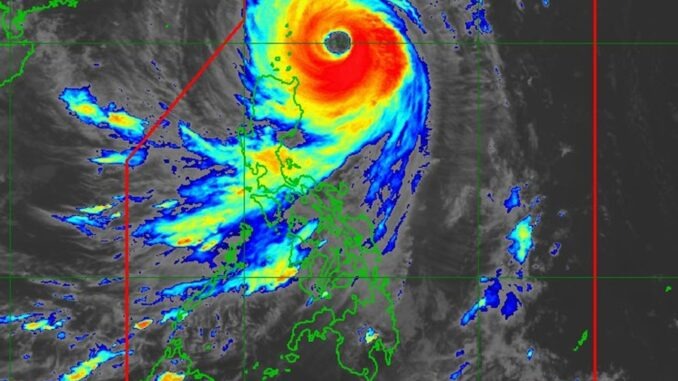
Ameteorologist has pointed out the sheer size of Typhoon Kong-rey’s eye as the massive storm approached Taiwan on Wednesday.
As of Wednesday afternoon, Typhoon Kong-rey had maximum sustained winds of 130 mph, according to the website Zoom Earth. The storm has weakened slightly since Tuesday night, when it was categorized as a super typhoon with maximum sustained winds of 150 mph, equivalent to a Category 4 hurricane. Forecasts anticipate that Typhoon Kong-rey will weaken further by the time it makes landfall in Kaohsiung in the early morning hours on Thursday.
On Tuesday night, meteorologist Noah Bergren of TV station WOFL in Orlando, Florida, commented on the size of the storm’s eye.
“Super Typhoon Kong-rey is easily one of the largest eye’s in a major tropical system you will ever see on Earth,” Bergren posted on X (formerly Twitter). “Thing is absolutely massive.”
A wave crashes outside of Fugang Harbor in Taitung, Taiwan, ahead of Typhoon Kong-rey on Wednesday. The storm is expected to make landfall in Taiwan early Thursday morning. Annabelle Chih/Getty
AccuWeather senior meteorologist Alan Reppert told Newsweek that having a large eye doesn’t necessarily imply anything about the storm’s strength.
“It just means the winds with it are farther away from the center than if it was a smaller eye,” he said. “It doesn’t necessarily have any major defining characteristic of the storm.”
Reppert added that a stronger storm that’s been around longer usually has a wider eye than a newer storm.
Most spaghetti models—or computer models illustrating potential storm paths—show Kong-rey making landfall on Taiwan’s southeast coast and cutting across the island before emerging with maximum sustained winds of around 75 mph. Models indicate that the typhoon will exhibit a northeastern turn away from China, which will take it out to the East China Sea.
Kong-rey’s strength is uncharacteristic for this time of year, The New York Times reported, adding that the typhoon is expected to make landfall equivalent to a Category 4 hurricane.
Reppert warned that strong winds up to 140 mph with higher gusts could hit southern Taiwan, though the storm is expected to weaken as it moves over the island. An AccuWeather report warned of “significant structural damage, mudslides and landslides” from the storm, as up to 3 feet of rain is expected to lash Taiwan. The storm could either maintain its intensity or strengthen before it makes landfall early Thursday.
Eastern China and Japan also are expecting heavy rain as the storm progresses.
A typhoon is classified as a severe tropical cyclone occurring in the Northwest Pacific. A hurricane is the term for the same type of storm in the Northeast Pacific and Northern Atlantic. Outside of these regions, the storms are called tropical cyclones.
A normal family showed their house and now everyone dreams of living there!


There are moments when it seems like we have seen everything that could possibly surprise us.However, there are things that none of us have missed and that we have not yet seen.Kindly focus on the house whose occupants are just regular folks.

The wife is a stay-at-home mom, and the husband is an engineer for a corporation.Due to the family’s low income, they raise two tiny children who do not even attend kindergarten.The young family has just been residing in the 1942-built house for the past four years.A seemingly typical house becomes a nature lover’s paradise and ideal haven.It comprises three fully functional rooms and is 56 square meters in size.

The living area, which is open to the kitchen, is where they congregate most often.It features two huge windows that give in plenty of natural light, a dining table, and contemporary furnishings.It’s not going to leave anyone unimpressed and has a fantastic view.Take a look and share your thoughts with us!



Leave a Reply